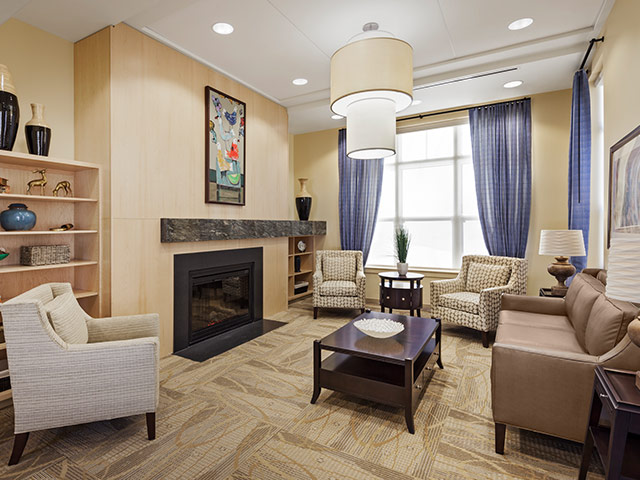Personalized Memory Care for Seniors in a Safe Environment
Personalized Memory Care for Seniors in a Safe Environment
Blog Article
All Regarding Memory Treatment Services: Why Small Memory Treatment Residences Are an Excellent Option
Memory care solutions play an important function in sustaining people with Alzheimer's and dementia. Small memory care homes attract attention for their individualized approach and intimate setting. With reduced staff-to-resident proportions, these homes cultivate more powerful links and tailored treatment. Residents profit from enhanced social communications and a risk-free setting. As families discover options, understanding the special advantages of small memory treatment homes comes to be vital. What elements should be taken into consideration when choosing the best home?
Comprehending Memory Care Solutions
While numerous might know with basic elderly care alternatives, understanding memory treatment services is important for households encountering the difficulties of cognitive decline. Memory treatment specifically satisfies individuals with problems such as Alzheimer's disease and other kinds of dementia. These services provide a structured environment that concentrates on boosting the lifestyle for homeowners through specialized treatment and support.Memory care centers are designed to guarantee security and protection, typically featuring protected atmospheres to protect against roaming. Educated personnel are readily available around the clock to help with daily activities, medication administration, and personal care. In addition, memory care programs usually consist of cognitive stimulation activities, tailored to involve homeowners and advertise mental health. Family members can gain from comprehending these solutions, as they make it possible for educated decisions concerning their liked ones' treatment, making certain that their certain needs and choices are resolved in a compassionate and helpful way.
The Advantages of Small Memory Treatment Houses
Little memory treatment homes offer distinctive advantages that can greatly improve the lifestyle for citizens with cognitive problems. One substantial benefit is the intimate atmosphere, which permits for individualized interactions amongst team and locals. This smaller sized setup cultivates purposeful partnerships, reducing sensations of isolation and anxiousness usually experienced by individuals with memory issues.Additionally, the lower staff-to-resident ratio in tiny memory treatment homes makes it possible for caregivers to offer even more alert supervision and assistance. This approach not only improves safety yet also advertises a complacency for the residents.Moreover, tiny memory care homes can adapt rapidly to the one-of-a-kind demands and preferences of each homeowner, enabling a more homey atmosphere. Such a setting can encourage social involvement and involvement in tasks, inevitably improving the daily experiences of those coping with cognitive disabilities.
Personalized Treatment Program for Citizens
Individualized care strategies are crucial in memory treatment homes, as they accommodate the one-of-a-kind demands and choices of each citizen. These strategies begin with detailed assessments performed by competent experts, who evaluate cognitive abilities, case history, and individual rate of interests. This tailored technique warranties that care is not just effective but likewise considerate of each person's dignity and autonomy.Moreover, customized care strategies are flexible, allowing changes as homeowners' needs progress with time. This versatility fosters a complacency and knowledge, which is vital for individuals dealing with memory challenges. Caregivers are trained to apply these plans regularly, providing assistance that straightens with the locals' regimens and preferences.Ultimately, customized treatment plans enhance the top quality of life for locals by promoting wellness, engagement, and independence, making them a basic aspect of memory treatment services in small memory treatment homes.
Creating a Home-Like Atmosphere
Creating a home-like environment is vital for fostering comfort and familiarity in memory care settings, as it substantially influences citizens' psychological well-being. Tiny memory treatment homes often prioritize customized touches, such as cozy color combinations, family members images, and acquainted furniture arrangements, which aid locals really feel a lot more comfortable. Incorporating aspects similar to a traditional home, like comfortable living areas and communal areas, motivates a feeling of belonging.Moreover, making use of natural light and outdoor areas can improve the environment, advertising leisure and peace. Employee play a considerable function in preserving this atmosphere by involving with locals in a compassionate way, treating them like family members. Routine activities, such as food preparation or gardening, can likewise add to a home-like feel, using possibilities for locals to participate in meaningful experiences. In general, producing a supporting environment supports cognitive feature and emotional security, making it a necessary facet of memory care solutions.
Improved Social Interaction and Area
Boosted social interaction and area are necessary components of memory treatment solutions. By fostering customized social interaction and creating a family-like atmosphere, these solutions advertise meaningful connections among homeowners. Team events and tasks additionally motivate participation, assisting individuals feel more included and sustained.
Individualized Social Interaction
While social interaction is crucial for overall health, numerous people with memory disabilities frequently battle to involve meaningfully with others. Personalized social interaction in memory treatment homes addresses this challenge by creating customized tasks that accommodate locals' distinct passions and capacities. By concentrating on private preferences, caregivers can promote connections that reverberate deeply with each person. Tasks such as art therapy, songs sessions, and guided conversations promote cognitive excitement and psychological expression. In addition, tiny group settings urge sociability and enable even more intimate communications, improving sensations of belonging. This approach not only fights feelings of seclusion however additionally equips residents to preserve a feeling of identity, ultimately adding to boosted psychological wellness and top quality of life.
Family-like Environment
In a memory care setup, fostering a family-like ambience significantly enhances social interaction and builds a feeling of neighborhood amongst locals. Smaller sized memory treatment homes often prioritize intimate settings, permitting residents to form closer links with each other and team members. This nurturing atmosphere advertises count on, which is vital for people with memory impairments. Residents are more probable to engage in discussions and share experiences, producing a supportive network that relieves feelings of loneliness. The knowledge of common areas and regimens adds to a sense of belonging, even more motivating social communication (personalized memory click here for more info care). In such setups, psychological bonds prosper, leading to boosted total health and a better of life for homeowners as they browse their day-to-day experiences with each other
Group Activities and Events

Safety and Security Features in Small Homes
Several little homes created for memory care integrate important safety and safety and security attributes to assure the wellness of citizens. These homes commonly use secure access and departure indicate avoid roaming, an click for source usual concern among people with memory problems. Additionally, monitoring systems and alarm mechanisms boost surveillance, ensuring that team can quickly reply to any type of uncommon activities.Interior designs are customized for safety, with reduced risks such as clutter-free pathways and sharp corners. Handrails and non-slip floor covering are generally installed to minimize the danger of falls. Personnel are learnt emergency protocols, ensuring they are planned for numerous situations.Moreover, personalized care strategies may consist of evaluation of private security demands, providing tailored solutions for each and every resident. Overall, these safety and security and protection functions develop a nurturing environment where locals can prosper while maintaining their dignity and self-reliance.
Exactly how to Pick the Right Memory Treatment Home
How can families ensure they choose one of the most ideal memory treatment home for their liked ones? The decision needs cautious factor to consider of numerous elements. Families need to review the facility's team credentials and training, making certain that caretakers are experienced in handling memory-related problems. Next off, it's important to examine the home's setting, focusing on security functions and whether it fosters a feeling of area and belonging. Going to the center can give understanding into daily tasks and the social atmosphere, which are essential for psychological stimulation and psychological wellness. Furthermore, households should ask about the treatment strategies used, ensuring they are customized to private demands. Thinking about the home's place and access for family gos to can add to a smoother change. By addressing these aspects, family members can make an enlightened choice that prioritizes their enjoyed one's convenience and high quality of life in a memory care setting.
Frequently Asked Concerns
What Certifications Should Team Members in Memory Care Homes Have?
Team member in memory care homes must have relevant certifications, experience in mental deterioration care, solid communication abilities, and concern. Recurring training in behavioral management and restorative treatments enhances their capacity to sustain citizens effectively.
Exactly How Do Memory Treatment Provider Differ From Typical Assisted Living?
Memory care services focus especially on people with memory problems, giving customized support and structured settings. On the other hand, see this here standard assisted living uses basic assistance with everyday tasks, doing not have the customized strategy needed for those with cognitive difficulties.
What Kinds of Activities Are Provided in Memory Care Residences?
Memory care homes generally supply a selection of activities developed to involve locals. Usual choices consist of art treatment, music sessions, cognitive video games, exercises, horticulture, and gatherings, all focused on boosting wellness and cognitive feature.
Can Residents Bring Their Own Items to Memory Care Homes?
Homeowners can normally bring their very own valuables to memory treatment homes, permitting them to customize their living space - personalized memory care. This method helps create a familiar atmosphere, advertising convenience and a feeling of identity for the individuals

Exactly How Are Member Of The Family Associated With the Treatment Process?
Member of the family play a vital role in the treatment process, usually taking part in decision-making, going to care meetings, and offering psychological support. Their involvement fosters a joint setting, improving the resident's overall wellness and top quality of life. While many might be acquainted with basic senior care alternatives, recognizing memory care solutions is crucial for family members facing the difficulties of cognitive decrease. These services provide a structured atmosphere that concentrates on boosting the high quality of life for locals via specialized treatment and support.Memory care centers are developed to guarantee safety and safety and security, often featuring protected atmospheres to avoid wandering. Customized care strategies are crucial in memory treatment homes, as they cater to the one-of-a-kind demands and choices of each citizen. Team members in memory treatment homes need to possess appropriate certifications, experience in mental deterioration care, strong communication abilities, and empathy. Memory treatment services concentrate specifically on individuals with memory impairments, providing specific support and structured environments.
Report this page